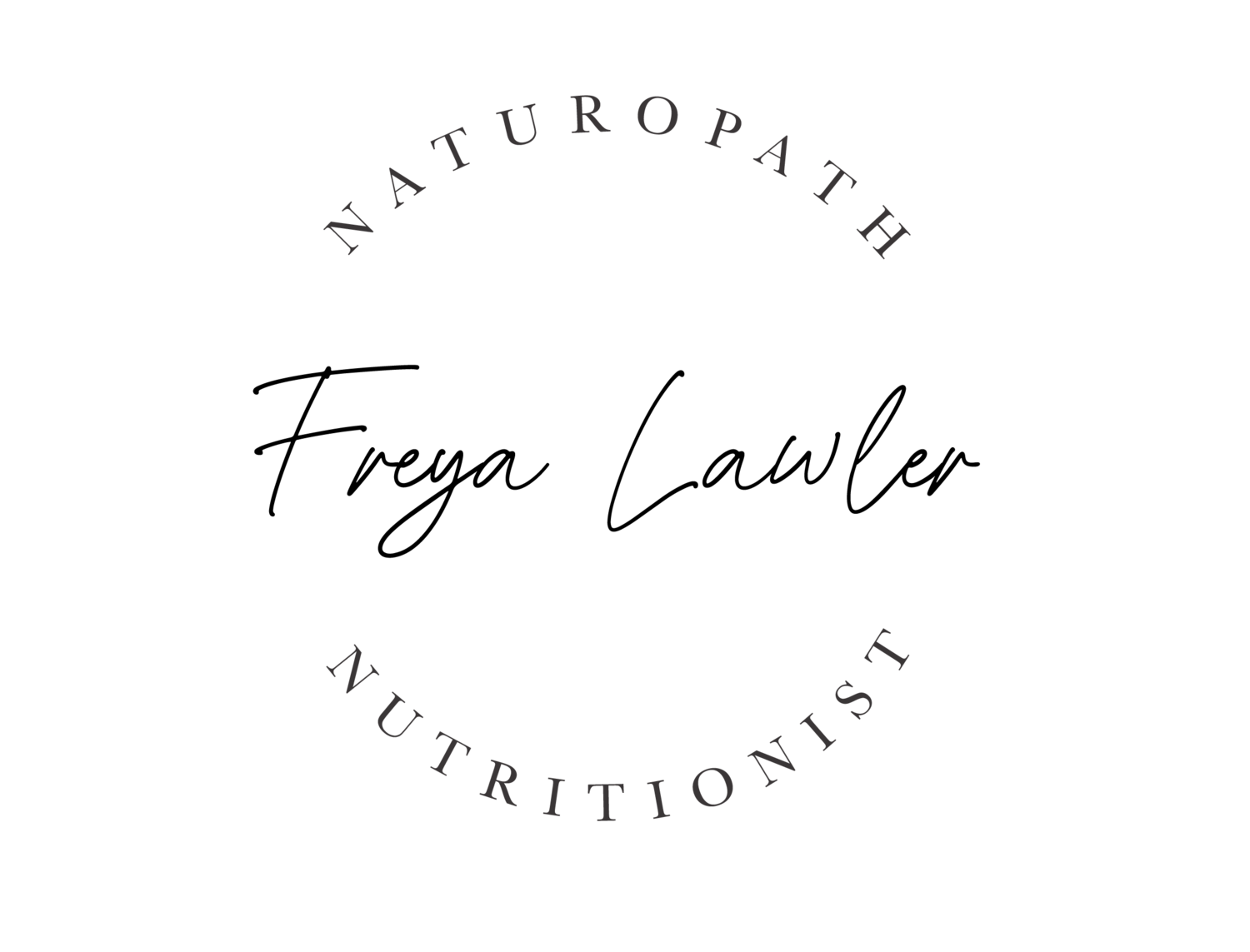How to Naturally Balance Your Hormones
You know it’s only a few days away from your period when your anxiety is through the roof, you’re snappy, and your breasts are tender and swollen. You’re wondering how on earth you can get through another month of these symptoms without breaking down. Your period arrives it’s heavy, clotted and all you want to do is curl up in a ball and never leave the bed.
This is the story I hear in clinical practice all too often but guess what - it really doesn’t have to be this way. In clinic, we support our patients to achieve a happier and healthier menstrual cycle by getting to the root cause of what is actually driving the issue.
What’s causing my period issues?
Let’s take a look at the most common root causes of hormone imbalances:
1) Blood sugar imbalance
2) Stress (HPA axis dysfunction)
3) Gut health imbalances
4) Environmental toxins and chemical overload
5) Nutritional deficiencies
How do I identify what’s causing my hormone imbalance?
To identify your root cause, ask yourself the following questions:
1) Do you get hangry, anxious, moody or light-headed in between meals or frequently skip meals? Or do you need high-sugar snacks to keep your energy levels up?
2) Are you ‘stressed out’ most days?
3) Do you suffer from bloating, constipation, diarrhoea, or reflux?
4) Are you exposed to chemicals on a daily basis IE: conventional makeup and skincare products, conventional household cleaning products, dry cleaning?
5) Do you have weak and brittle fingernails, dry skin, or frequent infections?
(If you answered yes, this might be one piece of the puzzle in understanding the root cause of your hormonal imbalance)
How do I naturally balance my hormones?
#1 Balance your blood sugar levels
Spikes and dips in blood sugar may cause excess strain on your adrenal glands, which release our stress hormones cortisol and adrenaline. When blood sugar levels are too high or too low, an excess of these hormones is released, which can trigger your body to release inflammatory cells into the bloodstream (resulting in hormone imbalances).
Blood sugar imbalance can further raise blood insulin levels (a common presentation in polycystic ovarian syndrome and difficulty losing weight). Insulin is a hormone responsible for the delivery of glucose from the food we eat into our cells to utilise for energy.
High dietary intakes of refined sugar can cause a surge in insulin hormone release, which can trigger excess testosterone production from the ovaries and adrenal glands (a common presentation in jawline acne, abnormal hair growth, and hair loss usually linked with a condition called Polycystic Ovarian Syndrome).
Something as simple as the food you eat can cause profound impacts on a variety of female hormones, anxiety levels and fatigue.
How to balance your blood sugar naturally:
Enjoy one palm-sized portion of protein with every meal. Depending on your exercise output, you want to aim for 1-2g protein per kg of body weight
Aim to have your highest protein and lowest carbohydrate meal for breakfast. This will prevent a blood sugar rollercoaster for the rest of the day (aim for 30-50g protein here)
Snack regularly on protein-rich snacks (raw nuts, organic eggs, legumes, jerky, protein bars)
Take a 10-minute walk after dinner (or after higher carbohydrate meals)
Shot apple cider vinegar 10-15 minutes before meals to help reduce a blood sugar spike after eating
#2 Check your stress levels
With the pace of our current lifestyle, it’s no surprise stress is on the rise. If under control, stress is not a huge concern and it can, in fact, be beneficial in keeping us motivated however, when it starts to overtake our lives and become a daily occurrence, this is when it can start to cause chaos for your hormones.
If the stress is persistent and prolonged, our stress hormones cortisol and adrenaline are screaming out ‘there are more important things to take care of right now’ and therefore put hormone production and reproductive health at the bottom of the list. It is important to remember that hormones are like an orchestra, everything must be in symphony for hormonal balance and harmony to occur.
Therefore, keeping your stress levels in check is essential for achieving hormonal balance. The hypothalamus is the master gland when it comes to hormones. However, it is incredibly sensitive to stress.
For example, in athletes, it is common for these individuals to lose their periods as their bodies are under high stress due to the intensity of their training. Stress in the body can also look like not eating enough. When you are in a calorie deficit, this places stress on your body causing a disruption to your menstrual cycle.
Any of these prolonged stressful events can trigger the hormones in the hypothalamus to become non-responsive resulting in changes to your menstrual cycle.
The key to happy and healthy periods is to keep your stress levels in check.
How to manage stress levels
Ensure adequate sleep 7-8 hours per night
Reduce over-exercising
Decrease sympathetic nervous system overdrive by trying yoga or meditation
Check-in with your breath and reset your nervous system - You can try the 4,7,8 breath exercise anywhere: Breathe in for 4 seconds, hold for 7 seconds, breathe out for 8 seconds and repeat 3 times
Ensure adequate protein intake (1-2g per kg of body weight)
Keep your coffee to one per day if you must, ensure this is after food* even better - opt for herbal teas, black or green tea and matcha
#3 Support gut microbiome balance
The health of your gut bacteria and the entire gastrointestinal tract is intricately related to the health of many other parts of the body. This includes the rest of your digestive system, your immune system, your ability to efficiently produce energy, and your mental clarity, mood and hormonal detoxification.
Recent research has discovered the health of your gut microbiome can significantly impact your circulating levels of oestrogen (It’s coined the ‘oestrobolome”). A significant amount of patients we work with in our clinic present with conditions such as endometriosis and fibroids, both of which are oestrogen-driven conditions influenced by the state of their gut health.
How to optimise your gut health
Ensure a daily bowel motion - If you aren't going once per day, increase fibre intake by adding in
1-2 tbsp ground flaxseed or psyllium husk to smoothies or porridge
Increase intake of fermented foods: kefir, sauerkraut, natural yoghurt, kombucha, kimchi
Increase prebiotic foods: bananas, asparagus, Jerusalem artichokes, onions, garlic, and leeks
Increase stomach acid production to optimise digestion: 10ml apple cider vinegar in 10ml warm water and enjoy 15 minutes before meals 3 times per day
*Consider functional testing if you experience long-term gastrointestinal symptoms that are yet to resolve. This can be particularly helpful for individuals with endometriosis and “endo belly” like symptoms.
#4 Reduce environmental toxins and chemical overload
Reproductive health and hormones are extremely vulnerable to environmental chemicals and contaminants during all stages of the life cycle. Adverse effects on health are seen when environmental chemicals (phthalates including BPA-containing plastics and endocrine-disrupting chemicals) affect the function, storage and metabolism of hormones, leading to hormonal imbalances.
Endocrine-disrupting chemicals are known to mimic the action of our own hormones and can cause conditions such as oestrogen excess.
How to enhance detoxification and reduce chemical overload:
#1 best thing you can possibly do before considering a “detox” is to reduce your exposure to chemicals in the first place.
Choose organic or pesticide-free food where possible - this guide is a great start.
Clean up your cosmetics and opt for natural products - enter your cosmetics into this website to check for their level of safety
Increase brassica vegetables to 3-4 serves per day to boost detoxification: these vegetables include cabbage, cauliflower, broccoli, bok choy, brussels sprouts, kale
Enjoy beans and legumes daily
Enjoy detoxifying culinary herbs and spices daily: garlic, onion, rosemary, turmeric
Sweat: Cardio exercise or sauna
#5 Check for nutritional deficiencies
Nutritional deficiencies are very common and play a significant role in hormonal imbalances. The most common nutrient deficiencies seen in hormonal imbalances include B vitamins, magnesium, zinc, vitamin D, and essential fatty acids.
Unfortunately, in Australia, many fruits and vegetables are grown in nutrient-depleted soils, making it difficult to obtain nutrients from the food we eat. Sourcing organic vegetables that are grown in nutrient-dense soil and where crop rotation is practised is recommended (Learn more here).
Signs and symptoms of nutritional deficiency can include:
Reduced stress tolerance, painful
Periods, spotting before your period, acne that won't heal, dry skin, weak and brittle fingernails,
Frequent infections (and more!)
Causes for nutrient deficiency may be due to:
Excess caffeine intake
Regular or excessive alcohol intake
Oral contraceptive pill
Inadequate fruit and vegetable intake
Extreme dieting
Chronic stress
Gastrointestinal dysfunction and malabsorption of nutrients
How to replete nutrient deficiency:
Enjoy 7-9 servings of preferably spray-free vegetables daily
Enjoy 2 serves of wild fish per week
Reduce caffeine to no more than once daily
Reduce alcohol intake to no more than 5xstandard drinks per week
Avoid extreme dieting
Reduce stress - practice mindfulness meditation, yoga
Nutrient supplementation (always chat to a qualified health practitioner before undertaking any new supplement regime)
Review blood tests for “optimal” ranges vs acceptable ranges (work with us here to review your pathology)
I believe when you are informed with the right information on how their body actually works, and how to listen to the messages your body is telling you, you can begin to make healthy choices that are specific to you and your unique symptoms.
In clinical practice, I have seen countless women turn around their hormonal imbalances and report a reduction in PMS, PMDD, period pain, irregular cycles and acne in as little as two cycles. This requires a dedicated approach to dietary and lifestyle changes, but it can certainly be done!
Book in today to get your cycle back on track.
Freya Lawler – BHSc Naturopath, Nutritionist, & Natural Fertility Educator
My expertise in women’s health, hormones and gastrointestinal complaints stems from my own personal journey. I experienced long-term symptoms in these areas which required a collaborative approach to healing, consisting of both natural and conventional practices.
I consider both naturopathy and nutrition as complementary medicines, that operate beautifully alongside conventional medicine where and if required. My personal health and wellbeing have been lifted exponentially since undertaking this work, and I would love nothing more than to empower you on your own personal journey to achieve elevated wellness, optimise your fertility and manage your endometriosis symptoms.








